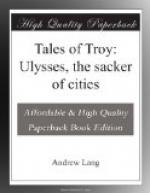The Greeks were sorry for him, but he was not a pleasant companion, shrieking as he did, and exuding poison wherever he came. So they left him on the lonely island, and did not know whether he was alive or dead. Calchas ought to have told the Greeks not to desert Philoctetes at the time, if he was so important that Troy, as the prophet now said, could not be taken without him. But now, as he must give some advice, Calchas said that Philoctetes must be brought back, so Ulysses and Diomede went to bring him. They sailed to Lemnos, a melancholy place they found it, with no smoke rising from the ruinous houses along the shore. As they were landing they learned that Philoctetes was not dead, for his dismal old cries of pain, ototototoi, ai, ai; pheu, pheu; ototototoi, came echoing from a cave on the beach. To this cave the princes went, and found a terrible-looking man, with long, dirty, dry hair and beard; he was worn to a skeleton, with hollow eyes, and lay moaning in a mass of the feathers of sea birds. His great bow and his arrows lay ready to his hand: with these he used to shoot the sea birds, which were all that he had to eat, and their feathers littered all the floor of his cave, and they were none the better for the poison that dripped from his wounded foot.
When this horrible creature saw Ulysses and Diomede coming near, he seized his bow and fitted a poisonous arrow to the string, for he hated the Greeks, because they had left him in the desert isle. But the princes held up their hands in sign of peace, and cried out that they had come to do him kindness, so he laid down his bow, and they came in and sat on the rocks, and promised that his wound should be healed, for the Greeks were very much ashamed of having deserted him. It was difficult to resist Ulysses when he wished to persuade any one, and at last Philoctetes consented to sail with them to Troy. The oarsmen carried him down to the ship on a litter, and there his dreadful wound was washed with warm water, and oil was poured into it, and it was bound up with soft linen, so that his pain grew less fierce, and they gave him a good supper and wine enough, which he had not tasted for many years.
Next morning they sailed, and had a fair west wind, so that they soon landed among the Greeks and carried Philoctetes on shore. Here Podaleirius, the brother of Machaon, being a physician, did all that could be done to heal the wound, and the pain left Philoctetes. He was taken to the hut of Agamemnon, who welcomed him, and said that the Greeks repented of their cruelty. They gave him seven female slaves to take care of him, and twenty swift horses, and twelve great vessels of bronze, and told him that he was always to live with the greatest chiefs and feed at their table. So he was bathed, and his hair was cut and combed and anointed with oil, and soon he was eager and ready to fight, and to use his great bow and poisoned arrows on the Trojans. The use of poisoned arrow-tips was thought unfair, but Philoctetes had no scruples.




